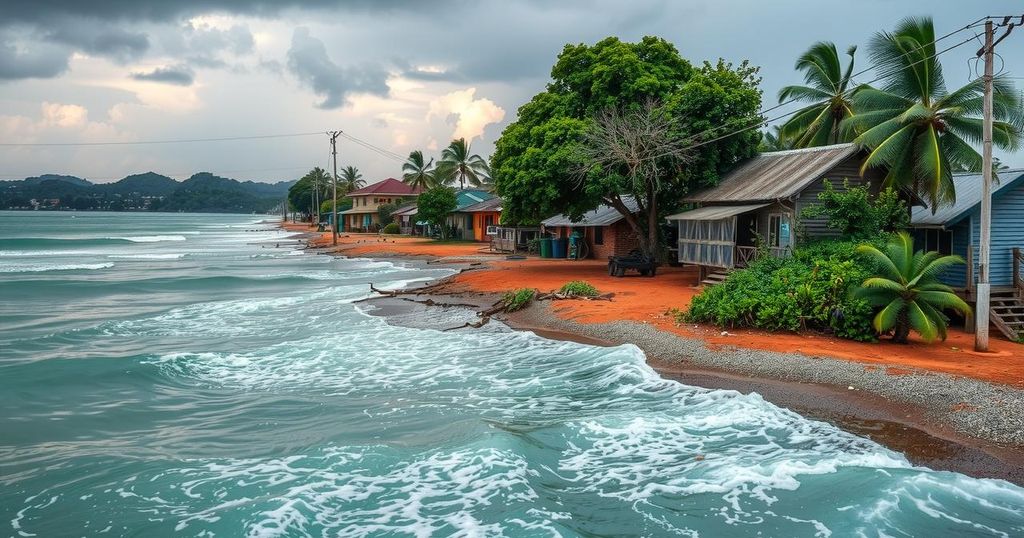World news
AFRICA, CHI, CHIDO, CLIMATE, CLIMATE CHANGE, CLIMATE CHANGE AND METEOROLOGICAL SERVICES, FRENCH INDIAN OCEAN, GLOBAL WARMING, GUY TAYLOR, INAM, LUCY MTILATILA, MALAWI, MOZAMBIQUE, NATIONAL INSTITUTE OF METEOROLOGY, NATURAL DISASTERS, PARIS AGREEMENT, PEMBA, UNICEF, ZIMBABWE
Amira Khan
0 Comments
Cyclone Chido: A Wake-Up Call for Climate Resilience in Mozambique and Malawi
Cyclone Chido has severely impacted northern Mozambique and Malawi, prompting extensive damage and dislocation. Following a trend of increasing cyclone frequency due to climate change, regional preparedness has improved, yet significant recovery challenges remain. Organizations like UNICEF are mobilizing urgent relief efforts as communities grapple with the compounded effects of weather events exacerbated by global warming.
Cyclone Chido has caused significant destruction across northern Mozambique, moving from the Indian Ocean to impact both Mozambique and Malawi. The cyclone, which struck on December 15, led to the dislocation of thousands within the provinces of Cabo Delgado and Nampula. This catastrophic event follows a trend of increasingly frequent and intense storms that have struck the region, including Cyclone Freddy in 2023 and Cyclone Idai in 2019. Lucy Mtilatila, Director of Climate Change and Meteorological Services in Malawi, explained that rising temperatures in the Indian Ocean contribute to the worsening frequency of cyclones, indicating a troubling pattern for southern Africa as climate change progresses.
As rainfall inundated the affected areas, Cyclone Chido brought wind speeds reaching 260 km/h (160 mph), with reports of casualties and extensive damage in cities such as Pemba. The National Institute of Meteorology reported more than 250 millimeters (10 inches) of rainfall within 24 hours, exacerbating the challenges in a region already vulnerable to climate impacts. UNICEF expressed profound concern about immediate and long-term effects on communities, particularly regarding access to education and healthcare, and the risk of waterborne diseases in the post-cyclone landscape.
Despite the devastation, Malawi showed improved preparedness for Cyclone Chido, with enhanced coordination among various sectors. Lucy Mtilatila noted the better response planning compared to previous cyclones, highlighting the critical role of proactive measures in mitigating disaster impacts. However, communities continue to grapple with lingering infrastructure challenges from past cyclones, hampering resilience. Mtilatila emphasized the necessity of strategic planning for settlements and responsible agricultural practices to enhance community resilience.
The Malawian government’s advance procurement of food and relief illustrates efforts to combat the dual challenges of drought and Hunger, which have been exacerbated by climate phenomena such as El Niño. Organizations like UNICEF, the UN World Food Program, and ActionAid are actively providing critical assistance in both Mozambique and Malawi, with calls for greater international support to bolster climate resilience in these nations. As the region adapts to the increasing frequency of cyclones, the emphasis on learning from these experiences is crucial for future recovery and preparedness.
Southern Africa faces unprecedented climate challenges, with the region experiencing a surge in severe weather events attributed to climate change. Recent cyclones have disrupted communities, destroyed infrastructure, and severely impacted agricultural outputs, compounding existing vulnerabilities. The area is subject to the consequences of global warming, thus necessitating strategic response measures. As governments and humanitarian organizations mobilize to address both immediate needs and long-term adaptations, the impact of climate change on weather patterns remains a pressing concern.
In summary, Cyclone Chido’s devastation accentuates the escalating climate challenges faced by Mozambique and Malawi, underscoring the urgent need for long-term preparedness and resilience strategies. With the increasing intensity and frequency of such storms driven by climate change, both nations must enhance their adaptive capacities, involving proactive planning and international cooperation to mitigate future impacts. The immediate and long-term humanitarian needs following this cyclone highlight the fragility of communities in the face of climate-related adversities.
Original Source: www.dw.com




Post Comment